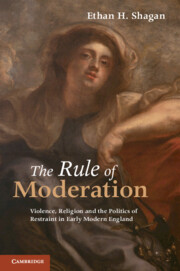Book contents
- Frontmatter
- Contents
- Figures
- Acknowledgements
- Abbreviations
- Prologue
- Part I Moderate foundations
- Part II Moderate churches
- Part III Moderate rule
- 5 English expansion and the empire of moderation
- 6 Social moderation and the governance of the middle sort
- 7 Moderate freedom in the English Revolution
- 8 How toleration became moderate in seventeenth-century England
- Conclusion
- Bibliography
- Index
- References
5 - English expansion and the empire of moderation
from Part III - Moderate rule
Published online by Cambridge University Press: 05 June 2012
- Frontmatter
- Contents
- Figures
- Acknowledgements
- Abbreviations
- Prologue
- Part I Moderate foundations
- Part II Moderate churches
- Part III Moderate rule
- 5 English expansion and the empire of moderation
- 6 Social moderation and the governance of the middle sort
- 7 Moderate freedom in the English Revolution
- 8 How toleration became moderate in seventeenth-century England
- Conclusion
- Bibliography
- Index
- References
Summary
Introduction: ‘between the old world and the new’
In 1578, the Elizabethan courtier and magus John Dee introduced his queen to the concept of a ‘British Empire’, in the process outlining the most expansive vision of Tudor authority ever written. In a self-conscious repudiation of Hapsburg claims to lordship over all the world, Dee argued historically and legally that Queen Elizabeth's empire included not only the whole of Britain and Ireland but also Denmark, Norway, Sweden, France, great chunks of Germany, the New World north of the forty-fifth parallel and even, via a fourteenth-century marriage treaty, Spain and Portugal and hence the New World in its entirety. Yet the title of Dee's remarkable work – Brytanici Imperii Limites – paradoxically stressed the moderation of his claims: these were the boundaries of Tudor authority, beyond which the law-abiding English would not extend themselves. Throughout the manuscript Dee affirmed the moderation of English aspirations and contrasted them with the excesses of foreign, especially Spanish, imperial projects. In proving English imperium over Scandinavia, for instance, Dee admitted that ‘the common guise hath anciently been with all nations excessively to extol some one of their notable princes’, passing off their ‘registered fantasies’ as history; in other words, most nations invented ancient conquests to make excessive claims to authority. The English, by contrast, relied upon the unimpeachable deeds of ‘our incomparable Arthur’, whose ancient conquests had been affirmed by a counsel of noblemen, scholars and lawyers who swore that ‘so far as they were able, following the path of righteousness and straying neither to right nor to left, they would expound the venerable institutions of their laws and customs, omitting nothing, adding nothing and disguising nothing by prevarications’. The British Empire, then, was moderate regardless of its geographic expanse because it was legitimate, whereas other European empires were immoderate because they usurped lawful English authority.
- Type
- Chapter
- Information
- The Rule of ModerationViolence, Religion and the Politics of Restraint in Early Modern England, pp. 187 - 219Publisher: Cambridge University PressPrint publication year: 2011



